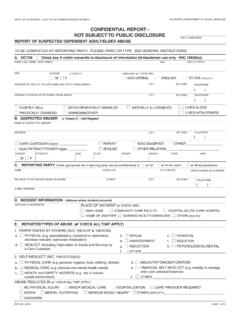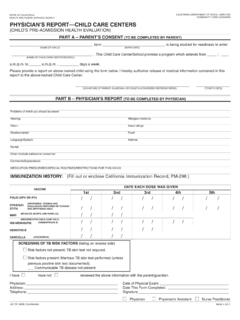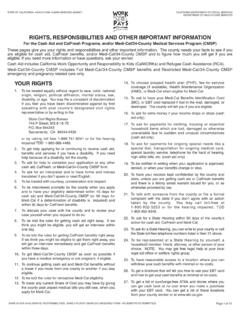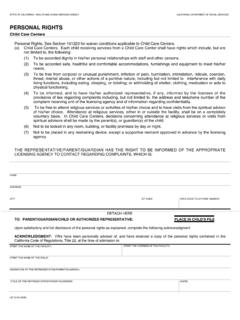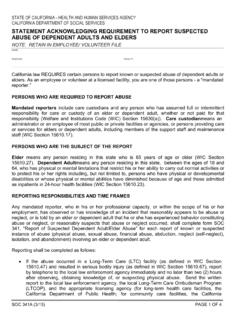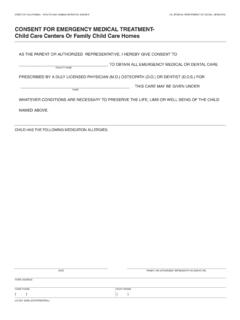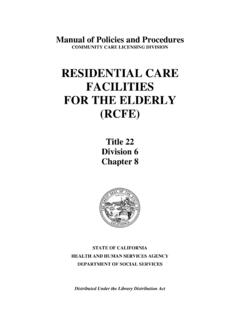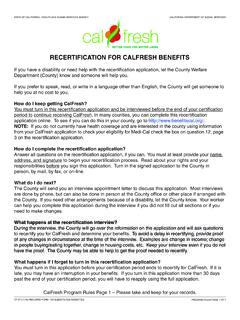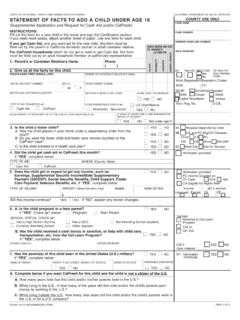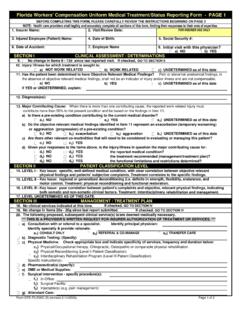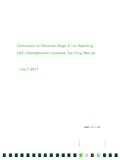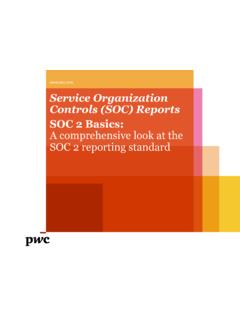Transcription of State and Federal Mandated Reporting Guidelines in Long ...
1 State and Federal Mandated Reporting Guidelines in Long-Term Care Facilities LTC Ombudsman refers to the local Long-Term Care Ombudsman Program. Law Enforcement refers to the local law enforcement agency. Written Report or SOC 341 refers to the State form for Reporting elder and dependent adult abuse."Abandonment" the desertion or willful forsaking by anyone having care or custody of that person under circumstances in which a reasonable person would continue to provide care and custody. Welfare & Institutions Code "Abduction" the removal from and/or the restraint from returning to this State of any elder or dependent adult who does not have the capacity to consent to the removal or restraint or without the consent of the conservator or the court if the individual is conserved. Welfare & Institutions Code section Deprivation denial by a care custodian of goods or services necessary to avoid physical harm or mental su ering.
2 Welfare & Institutions Code "Financial abuse" occurs when a person takes, or assists in taking, secretes, appropriates, obtains, or retains real or personal property for a wrongful use or with intent to defraud. Welfare & Institutions Code "Isolation" (1) Acts intentionally committed for the purpose of preventing, an elder or dependent adult from receiving his or her mail, telephone calls or meeting with visitors. (2) Telling a caller or prospective visitor that an elder or dependent adult is not present, or does not wish to talk with the caller, or does not wish to meet with the visitor where the statement is false, is contrary to the express wishes of the elder or the dependent adult, whether he or she is competent or not, and is made for the purpose of preventing the elder or dependent adult from having contact with family, friends, or concerned persons.
3 Welfare & Institutions Code Mental su ering the serious emotional distress caused by intimidating behavior, threats, harassment, or deceptive acts or statements made with intent to cause those reactions. Welfare & Institutions Code "Neglect" (1) The negligent failure of any person having the care or custody of an elder or a dependent adult to exercise that degree of care that a reasonable person in a like position would exercise. (2) Failure to assist in personal hygiene, or in the provision of food, clothing, or shelter. (3) Failure to provide medical care for physical and mental health needs. (4) Failure to protect from health and safety hazards. (5) Failure to prevent malnutrition or dehydration Welfare & Institutions Code Serious bodily injury: an injury involving extreme physical pain, substantial risk of death, or protracted loss or impairment of function of a bodily member, organ, or of mental faculty, or requiring medical intervention, including, but not limited to, hospitalization, surgery or physical rehabilitation.
4 Physical abuse that does not meet this de nition is considered to be abuse with no serious bodily injury . Welfare & Institutions Code section Physical abuse that must be reported to law enforcement includes: assault, battery, sexual assault, unreasonable physical constraint, improper use of a physical or chemical restraint or psychotropic drugs. Welfare & Institutions Code section Enforcement agencies may coordinate e orts with local LTC Ombudsman Programs to provide the most immediate and appropriate response to LTC facilities: State Mental Hospital or State Developmental Center. (Refer to Welfare & Institutions Code 15630 as amended by AB40- Yamada 2012)Local law enforcement must immediately refer the complaint of abuse to the Bureau of Medi-Cal Fraud and Elder Abuse (BMFEA) and to the local LTC Ombudsman, regardless of the local law enforcement s decision to investigate or close the matter.
5 Welfare & Institutions Code section 15630 requires local law enforcement to cross-report all instances of criminal activity that occur in a long-term care facility to the Justice Act (EJA) (Skilled Nursing Facilities- Federal Law)All instances of suspected crimes committed against residents or others receiving care in long-term health care facilities (skilled nursing facilities) receiving at least $10,000 per year in Medicare/ Medicaid funds, must be reported, by the facility, to at least one local law enforcement agency and to the Licensing and Certi cation Program of the California Department of Public Health. The EJA establishes two time-limits for the Reporting of reasonable suspicion of a crime, depending on the seriousness of the event: Events that result in serious bodily injury shall be reported immediately, but no later than 2 (two) hours after forming the suspicion, and all other reports within 24-hours.
6 NOTE: This training tool is not intended to cover all Reporting requirements for skilled nursing and residential care facilities. Reporters should refer to their respective licensing laws to assure all Reporting requirements have been in co-operation with O ce of the State Long-Term Care Ombudsman, Ombudsman Services of Northern California & California Long-Term Care Ombudsman Association. Funding provided from California HealthCare Foundation.
